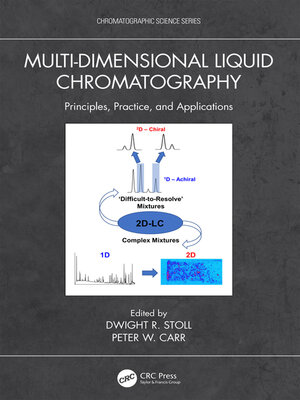Multi-Dimensional Liquid Chromatography
ebook ∣ Principles, Practice, and Applications · Chromatographic Science Series
By Dwight R. Stoll

Sign up to save your library
With an OverDrive account, you can save your favorite libraries for at-a-glance information about availability. Find out more about OverDrive accounts.
Find this title in Libby, the library reading app by OverDrive.



Search for a digital library with this title
Title found at these libraries:
| Library Name | Distance |
|---|---|
| Loading... |
Two-dimensional liquid chromatography (2D-LC) is finding increasingly wide application principally due to the analysis of mixtures of moderate to high complexity. Many industries are developing increasingly complex products that are challenging the separation capabilities of state-of-the-art 1D-LC and need new analytical methodologies with substantially more resolving power, and 2D-LC meets that need.
This text, organized by two leaders in the field, establishes a sound fundamental basis for the principles of the technique, followed by a discussion of important practical considerations. The book begins with an introduction to multi-dimensional separations and a discussion of the history and development of the technique over the past 40 years, followed by several chapters that provide a theoretical basis for development of 2D-LC methods, including foundational concepts regarding separation complementarity, under-sampling, and dynamics of liquid chromatography separations. Instrumentation for 2D-LC is discussed extensively, including practical aspects such as interface selection and setup. Building on this foundation, two separate chapters are focused on method development for non-comprehensive and comprehensive separations, followed by a chapter dedicated to data analysis. Finally, applications of 2D-LC in several fields ranging from pharmaceutical analysis to polymer science are summarized.
The book is an important resource for both students and practitioners who are already using 2D-LC or are interested in getting started in the field.
Key Features:







